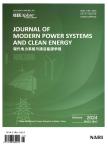Residential electrical vehicle charging strategies:the good,the bad and the ugly
作者机构:Hamilton InstituteMaynooth UniversityMaynoothCo.KildareIreland Department of Electronic EngineeringMaynooth UniversityMaynoothCo.KildareIreland BM ResearchDublinIreland School of ElectronicsElectrical Engineering and Computer ScienceQueen’s University BelfastBelfastUK
出 版 物:《Journal of Modern Power Systems and Clean Energy》 (现代电力系统与清洁能源学报(英文))
年 卷 期:2015年第3卷第2期
页 面:190-202页
核心收录:
学科分类:0830[工学-环境科学与工程(可授工学、理学、农学学位)] 0808[工学-电气工程] 08[工学] 0807[工学-动力工程及工程热物理] 0812[工学-计算机科学与技术(可授工学、理学学位)]
主 题:Electric vehicle Smart grid Decentralised control Centralised control Demand side management
摘 要:In recent years,a wide variety of centralised and decentralised algorithms have been proposed for residential charging of electric vehicles(EVs).In this paper,we present a mathematical framework which casts the EV charging scenarios addressed by these algorithms as optimisation problems having either temporal or instantaneous optimisation objectives with respect to the different actors in the power *** this framework and a realistic distribution network simulation testbed,we provide a comparative evaluation of a range of different residential EV charging strategies,highlighting in each case positive and negative characteristics.



